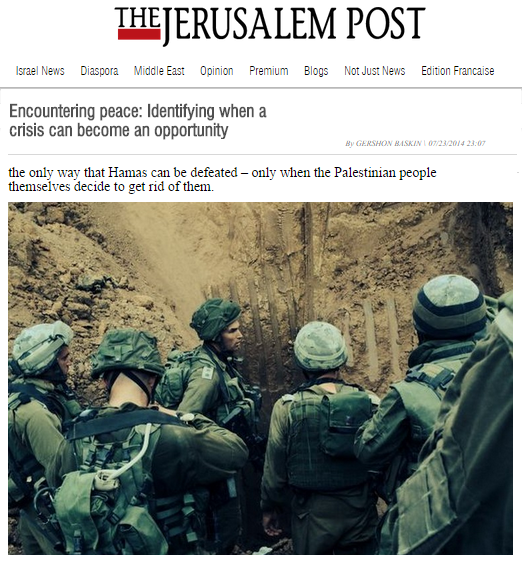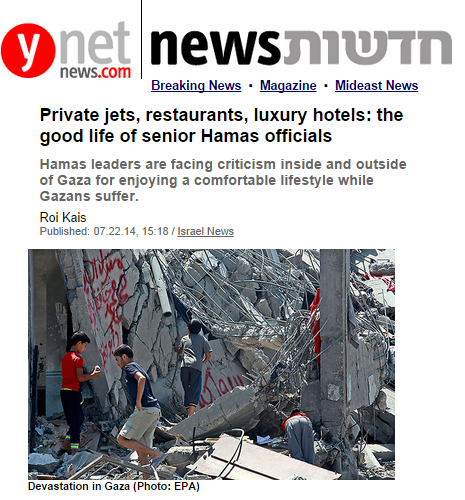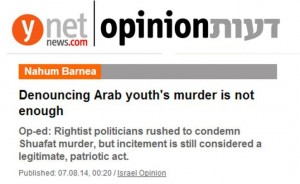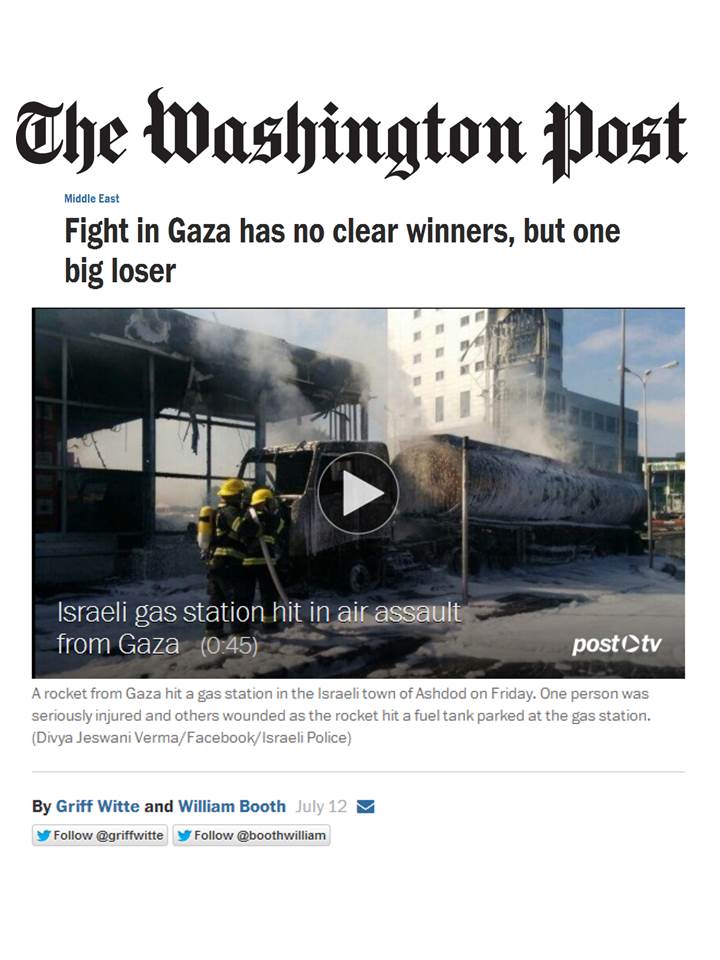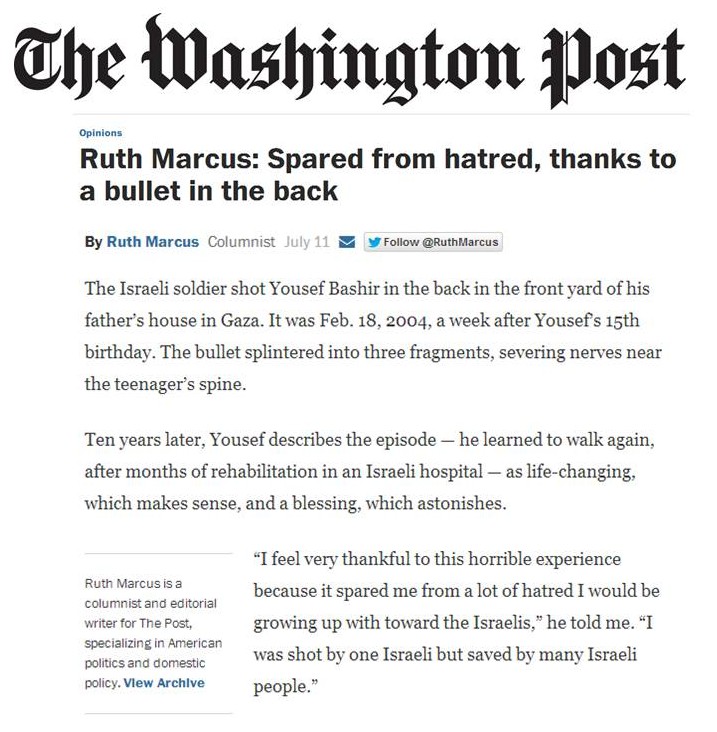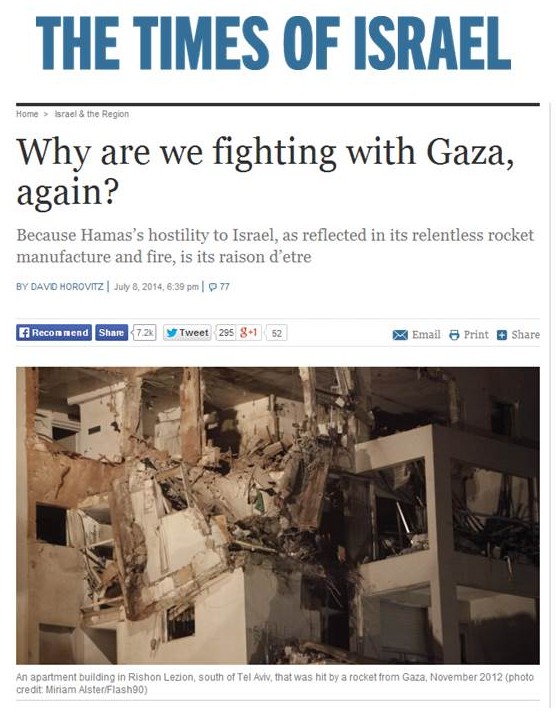Archive for the ‘Palestine’ Category
Hamas got rich as Gaza was plunged into Poverty
Published under Gaza, Global, Israel, Middle East, Mideast Negotiations, Palestine Jul 18, 2014Denouncing Arab youth’s murder is not enough
Published under Global, Israel, Middle East, Mideast Negotiations, Palestine Jul 18, 2014Abbas and moderates on both sides are suffering from the Hamas-Bennett war
Published under Gaza, Global, Israel, Middle East, Mideast Negotiations, OneVoice Movement, Palestine Jul 14, 2014Two painfully poignant articles came across my email box indicating the resentment Palestinians have towards President Abbas for participating in a peace conference in Israel amidst the war with Hamas in Gaza, and Hamas’s fury that Abbas has not done more to support them.
It is true that Abbas is stuck in between, and weakened by, violent extremism on both sides – from the kidnapping and murder of there Israeli teenagers, to the live burning of the Palestinian teenager in Shuafat – and that he can exert little influence on, or neutralize, either the extremists from Hamas or the extremist Israelis from Habait Hayehudi who fan the flames of hatred and seek to annex the West Bank.
But that is only part of the analysis. The true losers from all of this are ALL OF US. Every Israeli, Palestinian and international citizen is worse off, whether they realize it (as moderates do) or they don’t (as some extremists may think).
This is a wake up call to all of us.
These articles provide further proof – as if any was actually needed- to the Jews and Israelis and Westerners who have been brainwashed to think that Palestinian President Mahmoud Abbas is an extremist (!) or a ‘terrorist’ (!) by hateful edicts from Israeli Defense Minister Moshe Ya’alon to Economic Minister Naftali Bennett, to even Netanyahu on some occasions – that President Abbas is the strongest partner for peace and non-violent means to achieve it, equal in those values and temperament to President Shimon Peres, as the departing statesman has said himself.
And unless moderates on all sides stand up to seize back the agenda for conflict resolution and buttress the heroic moderate leaders who show strength in their courage and principled determination to pursue a two state solution through non violent means and through acknowledgment of the other, as Abbas has, and as Olmert had, and as Tzipi Livni and Isaac Herzog have courageously and selflessly and steadfastly done also, all of us will share the blame for the Balkanization and Lebanonization of the Holy Land.
Time we wake up and mobilize.
Why are we fighting with Gaza?
Published under Gaza, Introspection, Israel, Leadership, Middle East, Mideast Negotiations, Palestine Jul 10, 2014This article from David Horovitz is worth reading to remind us of the essence of the problem with Hamas. Horovitz has written equally compelling articles highlighting why President Abbas is heroic and worthy of support by the International community, and that it is a travesty that Netanyahu has weakened Abbas and strengthened Hamas. This article – and Horovitz – does not condone the occupation. That must end and Palestinians deserve a State with freedom, equality and mutual respect and recognition with Israel. But none of that would quell Hamas’s thirst to destroy all of Israel.
Palestinian Students Visit Auschwitz
Published under Introspection, Middle East, Palestine Apr 15, 2014I am inspired by the wisdom and courage of Professor Mohammed S. Dajani who took 27 Palestinian college students to visit Auschwitz as part of a project designed to teach empathy and tolerance.
Palestinian university students’ trip to Auschwitz causes uproar
By William Booth, Published: April 12
JERUSALEM — Professor Mohammed S. Dajani took 27 Palestinian college students to visit the Auschwitz concentration camp in Poland a few weeks ago as part of a project designed to teach empathy and tolerance. Upon his return, his university disowned the trip, his fellow Palestinians branded him a traitor and friends advised a quick vacation abroad.
Dajani said he expected criticism. “I believe a trip like this, for an organized group of Palestinian youth going to visit Auschwitz, is not only rare, but a first,” he said. “I thought there would be some complaints, then it would be forgotten.”
But the trip was explosive news to some, perhaps more so because it took place as U.S.-brokered peace talks between Israel and the Palestinians were in danger of collapse, and emotion surrounding the decades-old conflict is high.
Controversy was also heightened by rumors — untrue — that the trip was paid for by Jewish organizations. It was paid for by the German government.
Dajani said that many Palestinians think the Holocaust is used by Jews and Israelis as propaganda to justify the seizure of lands that Palestinians say are theirs and to create sympathy for Israel. Others, he said, think the Holocaust is exaggerated or just one of many massacres that occurred during World War II.
“They said, ‘Why go to Poland? Why not teach our young people about the Nakba?’ ” Dajani said.
The Nakba, or catastrophe, refers to the events of 1948 when the Arabs and Israelis fought a war. The Arabs lost, the state of Israel was born, and hundreds of thousands of Palestinians fled or were expelled from their homes and became a people of a diaspora, living even today as refugees here and across the Middle East.
An online version of an article about the trip published in the major Palestinian newspaper al-Quds was taken down by the publishers, reportedly because of heated invective in the comments section.
One reader said that taking Palestinian students to Auschwitz was not freedom of expression but treason.
Other critics of the trip included newspaper columnists, TV analysts and fellow researchers in the West Bank.
While the Palestinian students were visiting Auschwitz, a parallel group of Jewish Israeli students from Ben-Gurion University of the Negev and Tel Aviv University ventured to Bethlehem to hear Palestinians from the Dheisheh refugee camp tell their story. The responses of both groups of students — Israelis and Palestinians — would then be analyzed.
‘You feel the humanity’
A professor who founded the American studies program at al-Quds University in East Jerusalem (and whose department then-Sen. Barack Obama visited in 2006), the bespectacled Dajani wears a tweed blazer with leather elbow patches and carries around a copy of the Amos Oz classic “How to Cure a Fanatic.”
A firebrand in the Fatah political movement when he was young, Dajani said he is now a proponent of moderate Islam and moderate politics. He founded a group dedicated to both, called Wasatia, in 2007. His writing and conversation are filled with references to tolerance, reconciliation and dialogue. He supports two states for two peoples and thinks Jerusalem should be shared by Israelis and Palestinians.
“He is a theologian and a pragmatist, and in that regard, he is unique here. He is also extremely brave,” said Matthew Kalman, a commentator at the Israeli daily newspaper Haaretz who broke the story of the Auschwitz trip and who has followed Dijani’s career for years.
“He is also a proud Palestinian nationalist,” Kalman said, who regards the Israelis as occupiers. “But he thinks if you want to engage the Israelis, you have to understand where they’re coming from.”
The trip to Auschwitz was part of a trilateral research project called “Heart of Flesh — Not Stone,” named for a passage in the Book of Ezekiel and designed to not only increase empathy but also to study it. Organized by one of the oldest faculties of Protestant theology in Europe, at the Center for Reconciliation Studies at Friedrich-Schiller University in Jena, Germany, the trip was paid for by the German Research Foundation, a funding agency.
Some of Dajani’s detractors accused him of trying to brainwash Palestinian youth.
A university student who went on the trip but asked not to be named because of the charged atmosphere said the visit changed him. “You feel the humanity. You feel the sympathy of so many people killed in this place because of their race or religion.”
“Most people said we shouldn’t go,” the student said. “It is a strange thing for a Palestinian to go to a Nazi death camp. But I would recommend the trip.” He said it did not diminish his desire for a Palestinian state.
No regrets
Al-Quds University issued a statement saying that Dajani and the students were not representatives of the university. Palestinian universities cut off all ties with Israeli counterparts some years ago to protest Israeli actions.
Many Palestinians today oppose what they call “normalization,” which they say seeks to paper over the injustice of the Israeli military occupation by encouraging joint projects between Israelis and Palestinians as if they were both equal, the one not subject to the greater power of the other. Such joint efforts, they reason, will only prolong the occupation by providing Israelis with cover.
“I am against normalization with Israel as long as they are building settlements and walls,” said Hamdi Abu Diab, a leader of a popular committee that opposes the Israeli occupation. “But I do want Palestinians to know about the terrible things that happened to the Jews at Auschwitz. Because at the same time, I don’t want the Palestinians to be punished like the Jews were.”
Hani al-Masri, director of the Palestinian Center for Policy Research and Strategic Studies, said such a trip was not a bad idea. “It all depends who is running the show,” he said.
In a statement last week, Dajani wrote: “I will go to Ramallah, I will go to the university, I will put my photos of the visit on Facebook, and I do not regret for one second what I did. As a matter of fact, I will do it again if given the opportunity. I will not hide, I will not deny, I will not be silent. I will not remain a bystander even if the victims of suffering I show empathy for are my occupiers. And this is my final statement on this issue.”
Later, he added that in this debate, there may be no such thing as a last word.
Sufian Taha contributed to this report.
David Broza Bridges the Arab-Israeli Divide
Published under Israel, Middle East, Palestine Mar 11, 2014
Kol hakavod to David Broza on his wonderful work to bridge the divide between Palestinians and Israelis! Read the full New York Times piece after the jump.
Abbas talks to Israeli Students
Published under Israel, Middle East, Mideast Negotiations, OneVoice Movement, Palestine Feb 18, 2014On Sunday, the Knesset Caucus for Ending the Israeli-Arab conflict, which OneVoice Israel was instrumental in establishing, brought over 300 Israeli students to Ramallah for a personal and candid meeting with Palestinian President Mahmoud Abbas. The landmark discussion underscored that the centrist majority of Israelis and Palestinian supports an agreement on the core issues that is in the mutual interests of both sides. I’m so proud of the OVI team’s efforts. Read the New York Times coverage of the event after the jump.
Spotted by Daniel Lubetzky, by Julianna Storch
A Pivotal Moment for Israel
Published under Israel, Middle East, Mideast Negotiations, Palestine, United States Jan 20, 2014“My many years of involvement in the peace process teach me that the approaching decision is unlike previous ones. This is a watershed moment after which Israel will face a completely different situation – one which will be governed by new realities much less favorable than those Israel faces today. If Kerry’s mission fails, Israel will miss a historic window of opportunity to achieve an agreement that is optimal from its viewpoint. In the future, Israel may be forced to accept a bad agreement or live without an agreement, thereby compromising its Jewish or democratic character.”
- S. Daniel Abraham, Haaretz, Kerry Can Survive Failure, but Can Israel?
